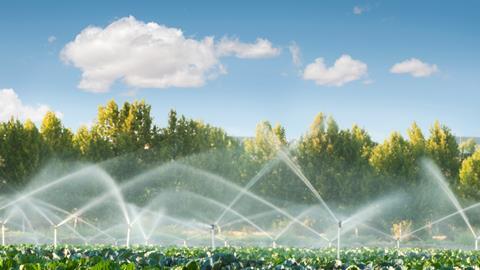Max MacGillivray of BeanStalk Global explains why major infrastructure projects are needed to ensure a stable water supply for farming in the east of the UK
Water is a fundamental resource for sustaining life, and its importance is amplified in the context of agricultural activities. As the eastern regions of the UK continue to experience challenges related to water scarcity and unpredictability due to climate change, the need for significant investment in water infrastructure projects becomes increasingly evident.
I was kindly invited to a recent King’s Awards event arranged by Annie Eaves of LinksEast that majored on sustainability in agriculture. The discussion at the event prompted this article and in it I delve into the reasons why investment funds should consider supporting major water infrastructure projects in the eastern UK regions, particularly to ensure a stable and secure water supply for farming activities. By implication, this also means enhancing the sustainability for the sector in a significant manner and to those funds’ commercial benefit.
Climate change and water scarcity
Climate change has brought about shifts in weather patterns, leading to more erratic rainfall and prolonged dry spells. These changes have direct implications for agriculture, as crops and livestock depend heavily on consistent water availability. Investing in water infrastructure projects such as reservoirs, irrigation systems, and water storage facilities can help mitigate the impact of water scarcity on farmers’ livelihoods.
By providing a reliable water source, these projects can safeguard crop yields and maintain agricultural productivity, even during periods of reduced rainfall. It has been estimated that every 1°C increase in temperature in the UK will create a 27 per cent reduction of water availability for farming and for domestic use.
For key crops such as potatoes and salads, farmers need a guarantee of sometimes two years’ worth of water so they can plan cropping and guarantee supply to the retailers.
Enhancing agricultural productivity
Water is a critical input for crop growth, and without a steady supply, agricultural productivity is compromised. By investing in major water infrastructure projects, investment funds can contribute to increasing agricultural yields.
Adequate water supply enables farmers to optimise planting schedules, implement efficient irrigation practices, and maintain healthier soil conditions. This, in turn, leads to better crop quality and increased agricultural output, providing a stable foundation for the region’s food supply.
Diversification of water sources
Relying solely on traditional sources of water, such as rainwater, can leave farmers vulnerable to climate-induced fluctuations. Major water infrastructure projects can provide an alternative source of water, thereby reducing dependence on unpredictable weather patterns.
Investment in reservoirs and water storage facilities enables the collection and storage of excess water during wet periods, which can then be used during drier times. This diversification of water sources adds a layer of resilience to the agricultural sector and ensures a consistent water supply throughout the year.
Long-term economic benefits
Investing in water infrastructure projects can have substantial long-term economic benefits for both investors and the local economy. A reliable water supply can attract and retain agricultural businesses which contribute significantly to the region’s economic growth.
Moreover, by stabilising the agricultural sector, these projects can create a ripple effect that supports related industries, such as food processing, transportation, and distribution. This, in turn, stimulates job creation and boosts local economies.
Sustainable water management
Effective water management is a key component of sustainability. Major water infrastructure projects offer the opportunity to implement modern water conservation techniques and technologies. These projects can incorporate advanced irrigation systems, water-efficient farming practices, and monitoring technologies that optimise water usage.
By investing in such projects, investment funds can contribute to the overall sustainability of agriculture and the responsible use of water resources.
Successful example
Since its launch in February 2021 a water conservation scheme based in Felixstowe, Suffolk – that is unique to the UK – has saved over 800,000 tonnes of water from being lost to the North Sea. The water is instead reused to grow crops in the county.
Drainage water has traditionally been pumped away to the River Deben and the North Sea, damaging saltmarsh along the way. Now it is pumped back inland, conserving the saltmarsh and refilling 14 reservoirs, used by six local farms to irrigate their crops. The scheme was funded by the European Regional Development Fund.
The business model
Investment is presented for a designated water infrastructure project for the eastern regions (as per the Felixstowe project example) by an individual fund or a collective of investment funds.
Farm businesses “rent” availability of water from the scheme on a long-term basis, guaranteeing food supply for the retailer and the consumer, and helping to mitigate the farming businesses’ production costs. The fund recoups the investment via the rental model.
Conclusion
The eastern regions of the UK face ongoing challenges related to water scarcity and climate variability, making investment in major (and sustainable) water infrastructure projects a necessity. These projects hold the potential to secure a stable and dependable water supply for farming activities, bolster agricultural productivity, and foster significant economic growth.
As investment funds recognise the intertwined relationship between water security and agricultural sustainability, their support can play a pivotal role in ensuring a prosperous and resilient future for both farmers and the local communities.
By investing in these projects today, we lay the foundation for a more sustainable and prosperous agricultural landscape for generations to come.
Max MacGillivray is the founder and editor in chief of Beanstalk Global, which supports, educates, and promotes the international fresh food sectors through webinars, broadcasts, and interviews. He is also managing director of the executive recruitment and training business Redfox, which specialises in the fresh food, agri-business, and retail sectors.




